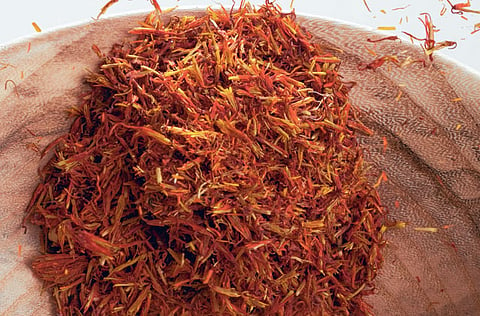Saffron hope for cancer patients
UAE scientists claim spice suppresses cancerous cells and boosts beneficial ones

Al Ain: UAE scientists have found a new anti-cancer agent in saffron, a spice and centuries-old home-made remedy, saying that the spice suppresses a large number of known cancer-related compounds.
The breakthrough has also revealed saffron's properties in boosting several beneficial compounds in the body in fighting the deadly disease. The spice is made from a flower and its scientific name is Crocus sativus, it is also used as seasoning and as a dye.
"We are excited to learn more about the molecular aspects of how saffron works, we are strong believers that an immediate clinical trial [testing saffron in liver cancer patients] will benefit a wide spectrum of cancer patients not only in the UAE but worldwide as well," said Professor Amr Ameen, a biologist at the UAE University in Al Ain who led the research team.
Saffron is widely used in food by people in Arab and Central Asian countries but its value has only been tested in the laboratory in recent decades. Past studies, said Professor Ameen, have hinted that saffron is beneficial in fighting depression, inflammation and memory loss and can be used as an antioxidant.
Collaborate
"Studies in animals and in human cells have even suggested that saffron can inhibit certain cancers," he said, noting that his study showed that it can stifle liver cancer in rats. In the new study, Professor Ameen and his colleagues fed saffron to 24 rats daily for 24 weeks.
Two weeks into the regimen the researchers injected the animals with diethylnitrosamine and 2-acetylaminofluorene, a chemical combination known to cause liver cancer. Professor Ameen found that only 16 per cent of rats given saffron developed nodules whereas eight rats that got the highest dose of saffron did not developed any nodules. Interestingly, 75 per cent of the animals that did not receive saffron developed cancer.
Professor Ameen said his team chose to study liver cancer because cancers that spread from other organs, such as the colon or breast, often end up there. Saffron kept in check a cancerous cell growth and the protein associated with abnormal cell growth. Also it reduced other compounds linked to liver damage and oxidative stress.
The exact mechanism of the anti-cancer effect of saffron, he said, is still unclear, but "most recently, we have identified the bioactive molecules that are most important in fighting cancer and have shown that those molecules are also active against other types of common cancers."
He said more results will be published soon to unravel a very unique pathway that saffron utilises to take on cancer. However for any of that to happen, he said the team is in desperate need of both logistic and generous financial support.
"To that end, I would be very happy to collaborate with all interested parties to get this project on a faster track and hopefully to contribute to the efforts of relieving the staggering humanity's burden of cancer worldwide," said the scientist.


